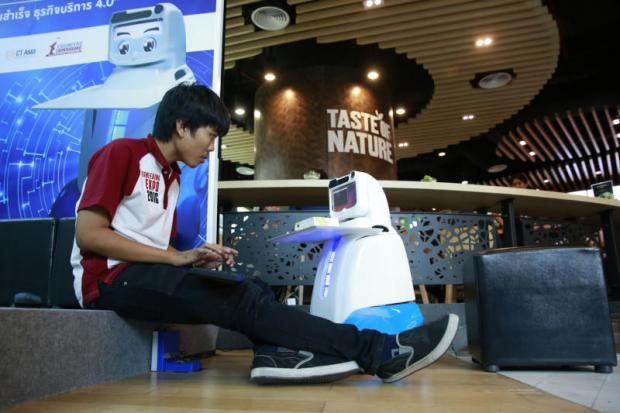Thailand: Thailand 4.0: Are we ready?
Officials, analysts express doubts that the overarching ambition to escape from the middle-income trap through high technology will be achieved any time soon. By Apornrath Phoonphongphiphat
The government has launched a new flagship policy that will be the master plan to free Thailand from the middle-income trap, making it a high-income nation in five years.
It is called Thailand 4.0. Thailand 4.0 has in fact become the buzzword among Thai businesses, recognised as a new engine of growth that will drive the country’s economy forward through high-tech industries and innovations that will push Thailand to produce high valued-added products and services.
But is the country ready for the Thailand 4.0 platform to help drive it to a higher economic sphere?
Officials and industry analysts have expressed their doubts based on several factors, including the lack of technical expertise and skilled workers, as well as inadequate levels of education.
The government says Thailand is now in the era of Thailand 3.0, when the country has developed itself to rely on heavy industry with certain technologies such as oil and
gas, petrochemicals and steel — produced largely for export — which dominate up to 70% of the GDP. That represents substantial progress from Thailand 2.0, when the country started becoming more self-sufficient and waded into light industries such as garments and food processing to serve domestic needs.
That milestone was far and away from the starting point several decades ago, Thailand 1.0, when the country relied only on exporting commodities.
“It is completely true that we need innovations to create added value to flee the middle income trap, but we need to rethink whether Thailand 4.0 is a model that matches what we have now,” says Somchai Jitsuchon, the research director for inclusive development at the Thailand Development Research Institute (TDRI).
Mr Somchai says it will take Thailand up to a decade to achieve the goal of Thailand 4.0 since it needs to tackle major obstacles, including education reform, to create a new generation workforce in line with the 4.0 era.
He says most of the human resources in Thailand are still in the era of 3.0, working in large enterprises with traditional bureaucratic styles that cannot adapt easily.
Thailand is also still lacking in specialists and experts, especially in high-tech industries, to help push Thai industries to modernise.
Moreover, some companies that have pushed into high-tech do not have enough manpower with the skills and ingenuity needed to handle the requisite machines or take their business to the international level via online channels. “With this problem, the government will have to allow the import of foreign specialists to help bring forward Thailand 4.0,” Mr Somchai says. “But that won’t be easy as local professional associations will oppose the idea as they want to reserve those professional careers for Thais only.”
Besides, Thailand still need some time to develop internet facilities in order to increase the number of internet users to meet Thailand 4.0’s online transactions, not only on e-commerce platforms, but also for financial transactions and online marketing, he says. According to national statistics, only around 56% of Thailand’s 68 million-strong population can access the internet and that is a major obstacle for Thailand to drive the country into the innovative era of 4.0, whereby most of the economic activities should be online, Mr Somchai says.
That was in line with a survey from global employment services giant Manpower Group, which found that Thailand is not quite ready to move to Thailand 4.0 due to the lack of a qualified workforce. “Most workers are stuck in the past and half of the population can’t access the internet,” says Suthida Kanjanakantikul, the marketing manager of Manpower Group.
She says both employers and employees need to adjust themselves to be more flexible since people in the 4.0 era can work from anywhere, eliminating the need to have fixed workplaces. That would create equality regarding the rights and duties of bosses and their employees. As Thailand 4.0’s working style is based on high technology, robots and other internet-related facilities will help reduce the need for a human workforce, bringing about another problem: unemployment.
TDRI’s Mr Somchai says the unemployment rate will rise substantially during the transition period to Thailand 4.0. But there is no clear sign that the government has a social policy to tackle the problem. Another major problem is the bureaucratic system of the Thai government administration. Every action plan is set to be done by several ministries, all of which are big, clumsily-run organisations, making the creation of such plans slow, Mr Somchai says. “Firstly, we need to change the attitude
of those civil servants to work more quickly, and at the same time we need to change the attitude of Thais and encourage them to move forward to the 4.0 era,” he says.
Another major problem is the development of technology, especially robotics, which is one of the 10 targeted industries the government aims to promote.
The government is trying to encourage local manufacturing companies to switch to using robots in their production lines, which can help develop robotics technology in Thailand.
But demand for such high-tech robots remains very thin at this stage since there are plenty of cheap migrant labourers from neighbouring countries available in the market, deterring companies from switching to high-tech robots. Thin demand for robots in manufacturing companies will make new investment, especially foreign investment in robotics industries in Thailand, a far-fetched proposition.
“And with very little investment in high-tech industries, it will be difficult for Thailand to move to Thailand 4.0,” Mr Somchai says.
He says Thailand needs to make foreign investors believe that the robotics sector is worthy of investment. But integration of the Asean Economic Community, making cheap workers even more readily available, will make it that much more difficult to entice Thai manufacturers to switch to robots, he says.
Source: http://www.bangkokpost.com/business/news/1173133/thailand-4-0-are-we-ready-


 English
English




